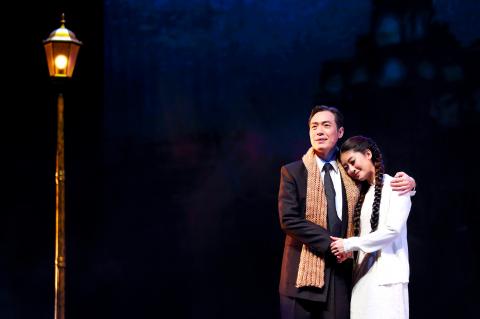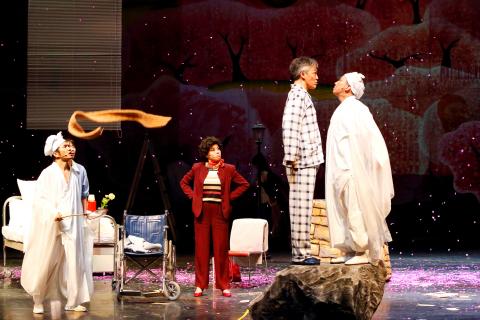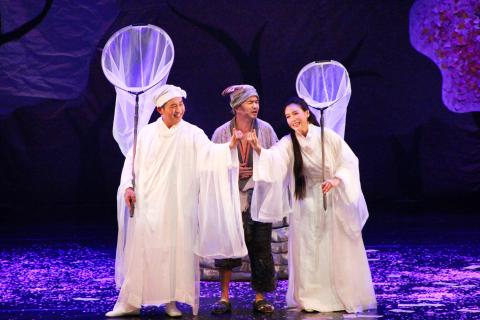The Secret Love in Peach Blossom Land (暗戀桃花源) was not the Taipei-based Performance Workshop’s (表演工作坊) first production; that honor went to That Night We Performed Crosstalk (那一夜,我們說相聲) in 1985.
Yet despite the company’s and founder Stan Lai’s (賴聲川) multitude of works since then, it is Secret Love in Peach Blossom Land, which premiered in 1986, that they remain most famous for.
The company has revived the play three times in Taiwan (1991, 1999 and 2006) — something previously unheard of in local theatrical circles — turned it into an award-winning film (1992’s The Peach Blossom Land), toured the world with it, including an 80-show run at the Oregon Shakepeare Festival in 2015 and staged the first official version in China in 2006, where it had been famous for years through bootleg DVDs and unauthorized performances.

Photo Courtesy of Performance Workshop
ICONIC CONTEMPORARY THEATER
Yet audiences, especially in the Chinese-speaking world, cannot get enough of the play. It is considered an iconic mainstay of contemporary Chinese theater.
So to mark the play’s 30th anniversary last year, Performance Workshop mounted a new production of the show, which it took to Singapore in February; Kaohsiung, Chungli and Chiayi in April and now moves into the National Theater in Taipei next week for six performances.

Photo Courtesy of Performance Workshop
Secret Love in Peach Blossom Land is about two companies that have accidentally been booked into same space for their dress rehearsals. Each has an opening night in just two days’ time, so neither is willing to concede the stage to the other.
One group needs to rehearse Secret Love, a tragedy about a couple separated by a China’s Civil War, centering on a dying man in Taipei and the woman he left in Shanghai.

Photo Courtesy of Performance Workshop
The other group is doing Peach Blossom Land, a comedy based on a classic Chinese poem about a lost fisherman who lands in a utopia where the people have no memories. However, the fisherman cannot forget his estranged wife, especially because two of the people he meets look just like his wife and her new lover.
As the two groups of players struggle for control of the space, they bicker, critique each other’s shows, steal each other’s props and eventually end up dividing the stage in half and trying to rehearse at the same time.
At its heart, Secret Love in Peach Blossom Land is about love, memories and the people we cannot forget, which is why it continues to strike a chord with so many people.
IMPROVISATION
Lai created the original production through structured improvisation with his cast, and continued to tinker with it in successive shows to keep things challenging. In 1991, that meant inviting movie star Brigitte Lin (林青霞) to make her theatrical debut as the Shanghai love, Yun Zhi-fan, a role she reprised in the film version.
In 1999, it was about inviting a younger generation of actors to step into the leading roles, while for the 20th anniversary production Lai invited the Ming Hwa Yuan Taiwanese Opera Company (明華園) to collaborate.
For this latest version, Lai turned the directing reins over to longtime Performance Workshop stalwart, actress and director Ismene Ting (丁乃箏), who played the role of the errant wife Chun Hua in the Peach Blossom Land between 1991 and 1999.
Ting said Lai had already perfected the play’s entire construct — the script, scenography and music selection — so her main job was “don’t mess it up.”
She chose some Performance Workshop regulars and other actors that she has worked with over the years, including Fan Kuang-yao (樊光耀), and Chu Chung-heng (屈中恆) — who were both so good in Ting’s A Blurry Kind of Love (愛朦朧,人朦朧) in 2015 — Chang Pen-yu (張本渝), Weng Quan-wei (翁銓偉) and Tang Tsung-sheng (唐從聖), who is perhaps better known as Action Tang.
Fan and Jacqueline Zhu (朱芷瑩) play the star-crossed lovers Jiang Bin-iu and Yun Zhi-fan in Secret Love, while Chu plays Master Yuan, Chang is Chun Hua and Tang is Lao Tao in the Peach Blossom Land portion.
The show comes in at just under three hours, including 20-minute intermission.

Taiwan has next to no political engagement in Myanmar, either with the ruling military junta nor the dozens of armed groups who’ve in the last five years taken over around two-thirds of the nation’s territory in a sprawling, patchwork civil war. But early last month, the leader of one relatively minor Burmese revolutionary faction, General Nerdah Bomya, who is also an alleged war criminal, made a low key visit to Taipei, where he met with a member of President William Lai’s (賴清德) staff, a retired Taiwanese military official and several academics. “I feel like Taiwan is a good example of

March 2 to March 8 Gunfire rang out along the shore of the frontline island of Lieyu (烈嶼) on a foggy afternoon on March 7, 1987. By the time it was over, about 20 unarmed Vietnamese refugees — men, women, elderly and children — were dead. They were hastily buried, followed by decades of silence. Months later, opposition politicians and journalists tried to uncover what had happened, but conflicting accounts only deepened the confusion. One version suggested that government troops had mistakenly killed their own operatives attempting to return home from Vietnam. The military maintained that the

Before the last section of the round-the-island railway was electrified, one old blue train still chugged back and forth between Pingtung County’s Fangliao (枋寮) and Taitung (台東) stations once a day. It was so slow, was so hot (it had no air conditioning) and covered such a short distance, that the low fare still failed to attract many riders. This relic of the past was finally retired when the South Link Line was fully electrified on Dec. 23, 2020. A wave of nostalgia surrounded the termination of the Ordinary Train service, as these train carriages had been in use for decades

Lori Sepich smoked for years and sometimes skipped taking her blood pressure medicine. But she never thought she’d have a heart attack. The possibility “just wasn’t registering with me,” said the 64-year-old from Memphis, Tennessee, who suffered two of them 13 years apart. She’s far from alone. More than 60 million women in the US live with cardiovascular disease, which includes heart disease as well as stroke, heart failure and atrial fibrillation. And despite the myth that heart attacks mostly strike men, women are vulnerable too. Overall in the US, 1 in 5 women dies of cardiovascular disease each year, 37,000 of them